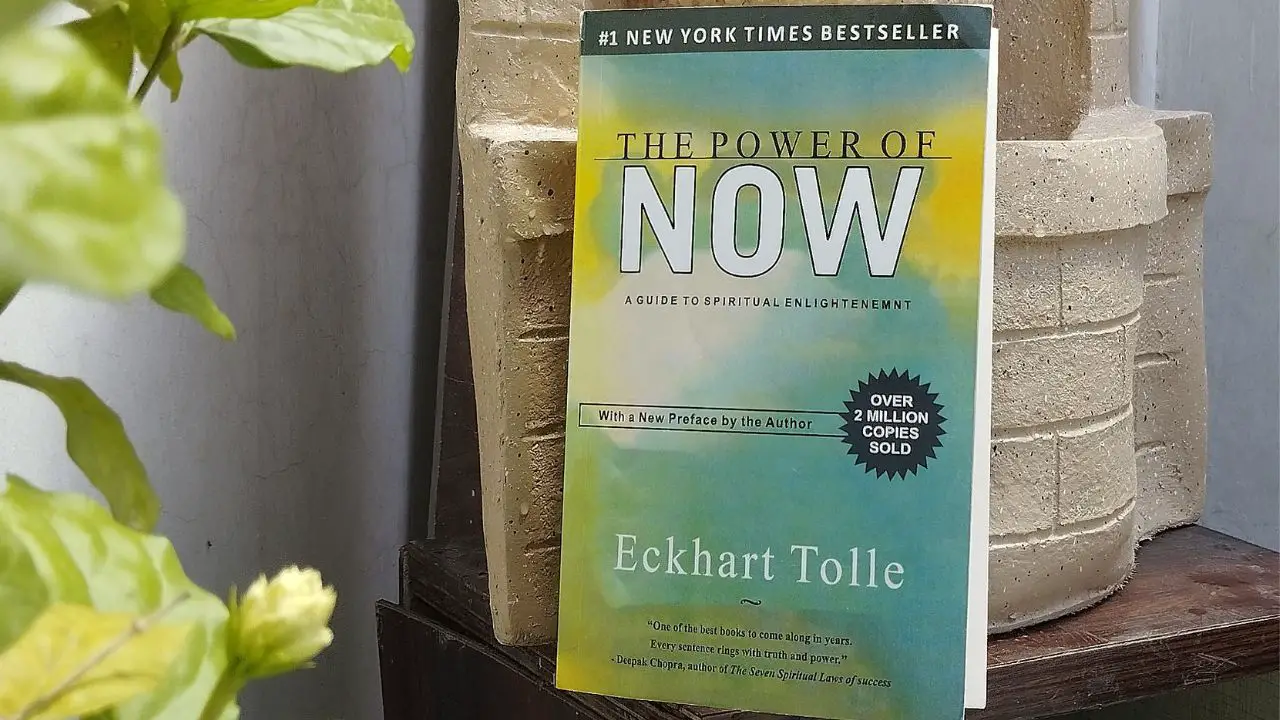The Power Of Now is a self-help guide to spiritual enlightenment for those ready for inner transformation. It brings the seed of enlightenment that each human being carries within them and makes it come alive.
We often think about the past and future. One minute, we are reminiscing or regretting; the next, we are planning or worrying. We neglect the present moment, which is fully available to us.
He discusses his personal experience with enlightenment and explains his core message, which is that when one’s full focus is on the immediate present, in the now, there is rarely any suffering.
Let’s know how to eliminate the negative influences of the past and the future and concentrate solely on the present moment.

- Chapter 1: You Are Not Your Mind
- Do you believe that you are a mind?
- Chapter 2: Consciousness: The Way Out Of Pain
- Create No More Pain In The Present
- Past Pain: Dissolving The Pain Body
- Ego Identification With The Pain Body
- The Origin of Fear
- The Ego’s search for wholeness
- Chapter 3: Moving Deeply Into The Now
- The Key To The Spiritual Dimension
- Letting Go of the Psychological Time
- Chapter 4: Mind Strategies For Avoiding The Now
- Chapter 5: The State Of Presence
- Chapter 6: The Inner Body
- Chapter 7: Portals into the Unmanifested
- Chapter 8: Enlightened Relationships
- Love / Hate Relationships
- What Actually Happened Here?
- Chapter 9: Beyond Happiness and Unhappiness, There Is Peace
- Chapter 10: The Meaning Of Surrender
- Surrender In Personal Relationship
- Takeaway
Chapter 1: You Are Not Your Mind
The mind is a superb instrument if used correctly. If you use it wrongly, it becomes destructive.
Our minds can do amazing things if we use them with purpose. However, if left unchecked, they can become like runaway trains and lead us down paths of negativity and destruction. The truth is that we often fall into the trap of being controlled by our thoughts rather than being the ones in control.
Do you believe that you are a mind?
No, You are in delusion. The instrument (mind) has taken you over. Just as dogs love to chew bones, the mind loves to solve problems. That’s why it does crossword puzzles and builds an atom bomb.
Can you free your mind whenever you want to? Have you found the Off button?
A moment of complete silence from the constant chatter in your head? It’s a common desire, but achieving a state of complete mental stillness can be elusive.
We often fall into the trap of identifying with our thoughts, becoming slaves to a relentless stream of worries, anxieties, and judgments. It’s like being unknowingly possessed by our minds.
But the moment you start to think positively, a higher level of consciousness becomes activated. Then, you will realize that the things that actually matter in life are love, beauty, creativity, joy, and inner peace—which arise beyond the mind.
Eckhart suggests thinking about yourself, your thoughts, and how you act.
You can do it by paying close attention to every step, every moment, and even your breathing every time you walk up and down the stairs in your house and your job. Be completely aware; become aware of a silent, powerful sense of presence.
You say that an emotion is the mind’s reflection in the body. But sometimes there is conflict between the two: the mind says “no” while the emotion says “yes” or the other way around.
Chapter 2: Consciousness: The Way Out Of Pain
Nobody’s life is entirely free of pain and sorrow. Isn’t it a question of learning to live with them rather than trying to avoid them?
Create No More Pain In The Present
The greater part of human pain is unnecessary. It is created by the mind as long as it runs your life.
You feel pain when you don’t like how things are, but don’t feel strong enough to change them.
There is some part of non-acceptance and some unconscious resistance to what is. This manifests itself on an emotional level as a negative feeling. The degree of pain depends on the degree of resistance to the present moment.
You can understand it by saying that the more you can honor and accept the now, the more you are free of pain and suffering and also free from the egoistic mind.
Past Pain: Dissolving The Pain Body
Another aspect of self-created pain is the “pain body,” a part of the self that needs you to feel pain so it can survive.
Accumulated pain is a negative energy field that occupies your body and mind. If you consider it an invisible entity, you are getting quite close to the truth. Emotional pain has two modes: Dormant and active. The body pain may be dormant 90%of the time, but it’s 100% in a deeply unhappy person.
Some people live almost entirely through their pain body, while others may experience it only in certain situations.
The pain body also wants to survive, just like every other entity, and it only survives if it unconsciously causes you to identify with it.
Pain can only feed on pain. It cannot feed on joy, which it finds quite indigestible. Some spiritual teachings state that all pain is ultimately an illusion, and this is true. For many women, the body pain awakens, particularly at the time preceding the menstrual flow.
Ego Identification With The Pain Body
The “ego” is a part of your mind that stops you from being happy.
The problem is your ego, which controls what you think and do without realizing it. For instance, if you think about a fight with someone later, you might realize you reacted too strongly. The ego can lead to situations of conflict with others, resulting in dissatisfaction with one’s present circumstances.
Once you understand the idea of being present and watching what happens inside you, you can understand it by experiencing it. It is the most transformational tool.
- Observe the resistance within yourself.
- Observe the peculiar pleasure you drive from being unhappy.
- Observe the compulsion to talk and think about.
Resistance will cease if you make it conscious. You can focus on the pain body, stay present as the witness, and initiate its transmutation. Only you can do this; nobody else can’t do it for you.
The Origin of Fear
The mind is responsible for pain. When you constantly think about memories, your mind produces pain.
And by planning for the future, occupying your entire life with regretful memories and anxiety-ridden future scenarios. By doing this, you avoid living in the present moment.
Future fear seems to have many causes: fear of loss, failure, hurt, and so on, but the ultimate fear is the ego’s, fear of death.
But your body knows what’s best for you, and listening to your body can help you get a clear sense of what is important in your life.
True power is within and available to you now. So first, live in the present moment to find happiness.
The Ego’s search for wholeness
- After you know your mind is causing you trouble, analyze your thoughts. What would be your next thought?
Emotional pain is a part of the egoistic mind that makes us feel like we are incomplete. In some people, this is conscious; in others, it is unconscious.
Focusing only on the present and ignoring the past or future will greatly improve your life. Because nothing ever occurs in the past or future; only the present is significant. Things happen only in a continuous stream of present moments.

Chapter 3: Moving Deeply Into The Now
You have already understood the basic mechanics of the unconscious state: identification with the mind, which creates a false self. The ego is a substitute for the authentic self rooted in being.
The mind is not dysfunctional in itself. It is a wonderful tool. Dysfunction sets in when you find yourself in it and mistakenly think of yourself as in it. Then, it becomes an egoistic mind, taking over your life completely. To be identified with your mind is to be trapped in time.
The Key To The Spiritual Dimension
Some people love engaging in dangerous activities such as mountain climbing, car racing, etc. Although unaware of it, these activities force them into the Now—a state free of time, problems, thinking, and the burden of the personality.
Since ancient times, spiritual masters of all traditions have pointed to the Now as the key to the spiritual dimension. Zen consists of walking along the razor’s edge of Now—to be so utterly present with no difficulty that no suffering can touch you.
For example, try looking outside the window you have looked at a few times before. Keep looking at this; you will find it a little different now. You will see it more vibrant and colorful because a new dimension was added to it.
At this time, you were free for a moment. You moved into now and, therefore, perceived the tree without the screen of the mind.
Letting Go of the Psychological Time
We all navigate two kinds of time:
- clock time for practical matters like schedules and deadlines and
- psychological time—the mental space we occupy when dwelling on the past or worrying about the future.
- Mastering this psychological time is the key to living a more fulfilling life.
Dwelling on past hurts or anxieties about the future creates a heavy burden, a constant loop in our minds. Letting go of the past (forgiving ourselves and others) and detaching from future anxieties helps us break free from this loop.
The enlightened person’s primary focus is always on the Now. Keep present with all your senses and be there where you are, not in the past or future.
To feel this freedom or enlightenment, stay fully in the present moment. Engage all your senses – feel the sun on your skin, listen to the sounds around you, savor the taste of your food.
Be truly present "here and now," not lost in yesterday's echoes or tomorrow's phantoms.

Chapter 4: Mind Strategies For Avoiding The Now
If I completely accept that time is ultimately an illusion, what difference will that make in my life? I still have to live in a world that is completely dominated by time.
This is also another belief that will not make much difference in your life. To realize this truth, you need to live it. When every cell of your body is so present that it feels vibrant with life, and when you feel life in every moment, it can be said that you are free of time.
But I still have to pay bills, and I am still growing old and dying like everybody else. So how can I ever say that I am free of Time?
To be free of time is to be free of the psychological need of the past for your identity and the future of your fulfillment.
- What do you mean by different levels of consciousness?
In sleep, you constantly move between the phases of dreamless sleep and dream state. Similarly, in wakefulness, most individuals transition between ordinary and profound unconsciousness.
You can read the book summary of The Power Of Subconscious Mind Summary to understand it more.
- What is ordinary unconsciousness?
It means identifying with your thought process and emotions, reactions, desire, and aversion. It is most people’s normal state.
In this state, you are run by the egoistic mind and unaware of it. It is a state not of acute pain or unhappiness but of an almost continuous low level of unease, discontent, boredom, or nervousness.
Chapter 5: The State Of Presence
You keep talking about the state of presence as the key. I think I understand it intellectually, but I don’t know if I have truly experienced it. I wonder- is it what I think it is, or is it something entirely different?
It’s not what you think about presence; the mind can’t understand it. You can’t think about the present, and your mind can’t understand it. Understanding presence is being present. For example, Close your eyes and say to yourself: I wonder what my next thought will be.” Then, I became very alert and waited for the next thought. Be like a cat watching a mouse hole.
Jesus says, “Be like a servant waiting for his master,”. The Servant does not know at what hour the master will come. So he stays alert, active, poised, and still lest he miss the master’s arrival.
In other parables, Jesus speaks of the five careless (unconscious) women who do not have enough oil (consciousness) to keep their lamp burning (stay present), so they miss the bridegroom (the now) and don’t get to the wedding feast (enlightenment).
The five stand in contrast to the five-wise women who have enough oil (stay conscious).
These parables are not about the end of the world but the end of psychological time. They point to the possibility of living in a new state of consciousness and transcending the egoistic mind.
Chapter 6: The Inner Body
Look beyond the words. I don’t like the word sin and other words like that. It implies that I have been judged and found guilty.
Over the centuries, people have interpreted words like sin and that the wrong way. If you can’t see beyond the interpretation, and if you cannot recognize to which the word points, then don’t use it.
The word honey isn’t honey. You can study and discuss honey for as long as you like. But you won’t know it until you taste it.
But when you taste it, the words are less important. Similarly, you can continuously talk or think about God for the rest of your life, but it does not mean you know this word deeply.
Connect yourself with your inner body. Feel it from within. Is it alive? Is there life in your hands, arms, legs, and feet?
Can you feel all body parts as a single field of energy? Only feel your body. Don’t use your mind. The more attention you give it, the stronger and clearer this feeling will become.
When we discuss the body, it is a part of disease, aging, and death, but it is not the ultimate real you. When you connect with your body, you live in the present moment.
- The key is to be in permanent connectedness with your inner body so that you can always feel it. This will rapidly deepen and transform your life.
- Due to this higher energy level, negativity cannot affect you anymore. You will not be defeated in your inner fight or the outside world.
- It slows down the aging process, strengthens the immune system, etc.
- Conscious breathing is the best way to put you in touch with the body gradually.

Chapter 7: Portals into the Unmanifested
In this chapter, Tolle invites us to consider different ways of connecting to the “unmanifested” presence of the now that we carry with us at all times.
One such example is a woman whose grown children have flown the coop. Years of loss and heartache had veiled her connection to the Now. However, a simple act – caring for a friend’s toddler – became a portal. Surrounded by the child’s innocent joy, she returned to a forgotten simplicity. Pulling out old children’s books and rediscovering a cherished toy from her kids’ past was a powerful trigger.
At that moment, the grief and loss receded, replaced by a profound sense of well-being and a reconnection with the essence of her own children – a love that transcended time.
- Tolle suggests that we practice being present to our inner energy for 10 to 15 minutes at a time to penetrate the body truly.
- The source of chi-he says that we develop the discipline to take attention away from the external world and experience the inner energy; we open the flow of chi.
- Dreamless sleep -Tolle asserts that we enter the unmanifested during sleep, but it is not liberating until we consciously enter.
- Silence -Toll identifies silence as a particularly important portal, since the interplay of sound and silence shapes our manifested experiences. He recommends that we pay particular attention to the silence between sounds.
Chapter 8: Enlightened Relationships
A great deal of the suffering we inflict upon ourselves involves relationships. Our culture constantly bombards us with the message that we are entitled to a great relationship (a special couple) and that we can never be happy without them.
It is unsurprising that we allow relationships to distract us from the present moment. We are stuck in the difficulties of the past and future. Enter the Now from where you are.
Love / Hate Relationships
Romantic Love is much more like an addiction. And many of you can relate to this. (Addiction is misplaced spiritual energy.)
Every addiction arises from an unconscious refusal to face and move through your pain.
Every pain starts with pain and ends with the pain. Whatever substance you are addicted to, alcohol, food, drugs, or a person, you are using something or somebody to cover your pain. That is why there is so much unhappiness after the initial euphoria has passed.
The most important thing is to know that relationships don’t make people unhappy or hurt. They bring out pain and unhappiness that is already present within oneself. Every addiction did the same., that you reach such a point. That by going there, it no longer works. And then you feel pain more intensely than ever.
What Actually Happened Here?
Relationships activate the pain body. To get better, we need to connect with our minds and the present moment. In fact, the moment that judgment stops through acceptance of what is, you are free of the mind. You have made room for love, joy, and peace.
You first stop judging yourself; then, you stop judging your partner.

Chapter 9: Beyond Happiness and Unhappiness, There Is Peace
- Is there a difference between happiness and inner peace?
Inner peace is not dependent on the condition being perceived as positive, but happiness depends on the followinf.
- Accepting things as they are is the first step to feeling peaceful.
- Moving beyond the dualism of good and bad, assuming that every circumstance, even the painful ones, can move us toward peace.
You may think you have become unsuccessful in your business and hit rock bottom, but trust me, there is enlightenment in it, too. Suffering leads to wisdom; suffering leads to enlightenment.
Even Buddha experienced enlightenment when he saw the world’s endless suffering and felt it inside him. That suffering led him to enlightenment.
Maybe we are not the people who feel the suffering of others, but we definitely become enlightened by our suffering. When we accept what is, every moment becomes the best possible moment.
Chapter 10: The Meaning Of Surrender
Surrender refers to the simple yet profound wisdom of yielding to rather than opposing the flow. If you find your life situation unsatisfactory or even intolerable, surrendering first is the only way to break the unconscious resistance pattern that prepares the situation.
Be present to resistance as it arises, and notice how the mind seeks to label and judge it. As we acknowledge, we become free to choose our actions rather than reacting.
Surrender In Personal Relationship
- What about people who want to use me, manipulate, or control me? Am I to surrender to them?
It is true that an unconscious person will try to use or manipulate others, But it is equally true that only an unconscious person can be used and manipulated. If you resist or fight unconscious behavior in others, you become unconscious.
But surrendering doesn’t mean allowing yourself to be used by unconscious people.
Not at all. It is perfectly possible to say ” no” firmly and clearly to a person or to walk away from a situation. And be in a state of complete inner nonresistance at the same time.
Takeaway
Find enlightenment from the suffering; if you really want to live life happily, be in the Now.
Forget the pains of the past and worries of the future; do your best in the present moment.
Don’t judge yourself and others, too, if you would like to enjoy a happy and healthy relationship in your life. It is essential to have healthy relationships in your life journey.
We hope that by following all these steps, you will be able to achieve a piece in your life.
